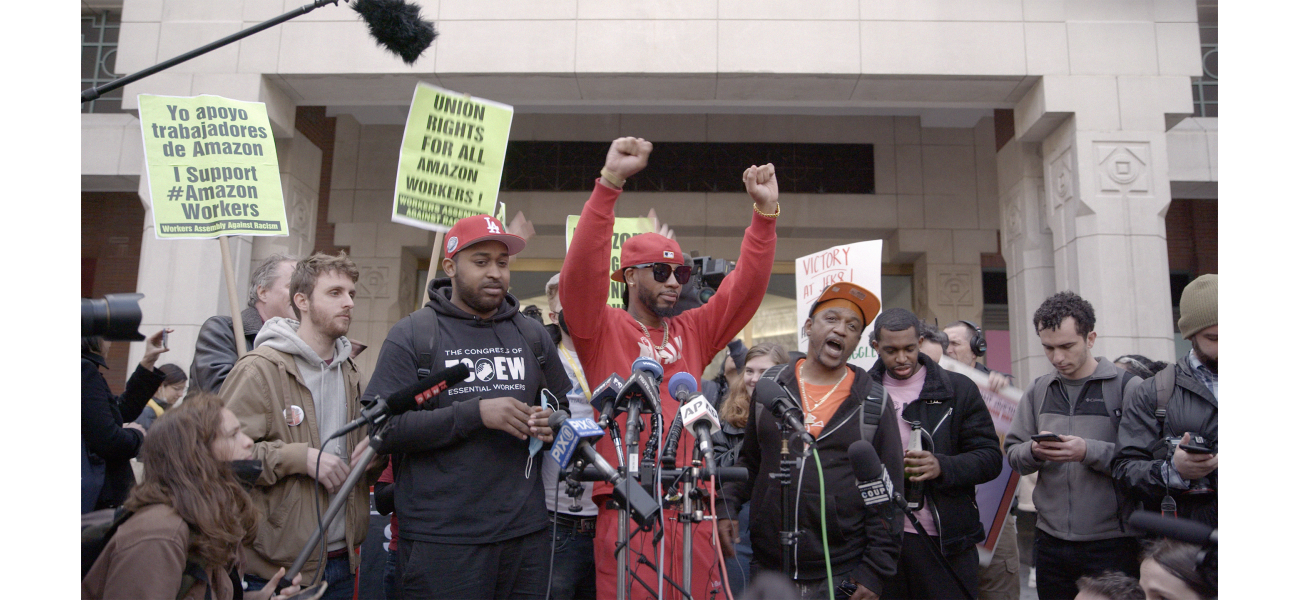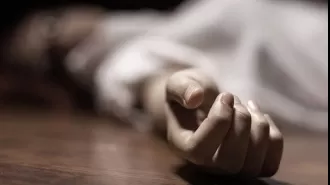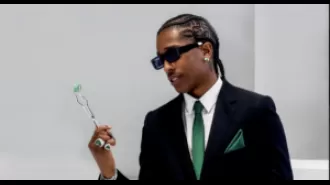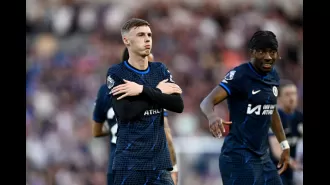One man's fight against a massive corporation, initially seen as a joke.
The wages and job conditions are dreadful.
December 22nd 2024.

It's hard to imagine life without the convenience of online shopping, especially during the holiday season. With just a few clicks, we can have our desired products delivered right to our doorstep in less than 24 hours. But have you ever stopped to think about the human cost behind this convenience?
Former Amazon employee, Chris Smalls, knows all too well the sacrifices that are made for this convenience. He used to work at one of the company's 110 warehouses in the United States, where he would travel for up to six hours a day just to ensure that customers received their orders on time. Chris, who is now 36, would leave his home in New Jersey and take a bus, a train, a ferry, and another bus to get to the JFK8 warehouse on Staten Island. There, he would spend 10 to 12 hours a day in a massive, windowless warehouse, earning only $12 an hour.
As a picker, Chris was responsible for selecting and gathering items for distribution. This involved locating the items, retrieving them, counting them, and checking for any damages or defects. And while he was doing this physically demanding job, he was also working two other jobs just to make ends meet.
"It was a very physically demanding job," Chris shares. "The warehouse was the size of 14 football fields, and we were on our feet all day. We only had a 30-minute lunch break, and the rest of the day was spent standing at our stations. The constant noise from the 16 miles of conveyor belts would leave my ears ringing, and even if I could hear, there was no time to chat with my co-workers."
Chris was the one who led the fight against one of the world's largest and most powerful companies. He explains how working at the warehouse felt like being in solitary confinement, with no windows and no time to talk to his colleagues without falling behind in productivity. According to another Amazon employee, the working conditions were so harsh that people would pass out from the heat during summer, and they were treated like "robots or slaves."
Initially, Chris was required to select 250 to 300 items per hour, but when the company introduced robots to assist with the picking process, the target was raised to 350 to 400 items per hour. He was good at his job and was promoted to assistant manager within a few months, in charge of up to 100 other pickers.
However, Chris's perspective of Amazon changed when the Covid-19 pandemic hit. He started to notice his co-workers getting sick, and he became worried about their safety. He felt that the company was not doing enough to protect its employees, who were sending out essential items to the rest of the world without having enough protective gear for themselves.
"It was a very eerie time to be working there," Chris recalls. "New York City was the epicenter of the world, and people were dying every 15 minutes. We were being told to social distance, but that was impossible to do in the warehouse."
With no union to turn to, Chris took it upon himself to organize his colleagues and fight for their rights. He listened to their concerns and, after the first confirmed Covid case at their warehouse, he demanded that it be shut down and sanitized. When the company refused to do so, he organized a walkout on March 30th. Just two hours after the walkout, Chris, who had always been a model employee, received a call informing him that he was fired for violating the company's 14-day quarantine policy. He had apparently come in contact with someone who had tested positive for Covid.
In an open letter to Amazon CEO Jeff Bezos, Chris explained that he didn't feel safe working at the warehouse and was concerned about the well-being of his colleagues, especially those with underlying health conditions who were risking their lives for just an extra $2 an hour. He described this as "blood money."
Chris then found out that the company had held an internal meeting where executives discussed a plan to smear his reputation and make him "the face of the entire union/organizing movement." But this only motivated Chris to continue fighting and advocating for his colleagues.
It was at this point that Chris, along with his friend Derrick Palmer, an Amazon assistant manager, decided to take on the giant corporation. They led a grassroots campaign to establish Amazon's first union, the Amazon Labor Union. They organized protests outside Bezos' mansions in New York, Beverly Hills, Washington DC, and Seattle, demanding better working conditions for all Amazon employees.
To reach out to their colleagues at the warehouse, Chris and his team set up a bus stop outside the fulfillment center, where workers arrived and left for their shifts. They provided them with information about their rights and working conditions, and even gave away free food. They also organized cookouts and barbecues, and Chris' aunt even cooked meals for the workers.
His David and Goliath story is now being told in a new documentary called "Union" by filmmakers Stephen Maing and Brett Story, which has been shortlisted for an Oscar. In the film, viewers get a glimpse of the challenges that Chris and his team faced while fighting for the rights of Amazon workers.
"The pay and working conditions are a nightmare," one picker shares in the documentary, while another worker comments, "It feels like we're slaves." Another employee reveals that her sister, who worked as a sorter, died from Covid because she didn't have any protective gear. Another worker had to sleep in their car outside the warehouse because they couldn't afford to pay rent.
Despite facing numerous challenges and setbacks, Chris and his team continue to fight for the rights of Amazon workers. Their story serves as a reminder of the sacrifices that many workers make for our convenience, and the importance of standing up for what is right.
Chris Smalls, a former employee of Amazon, knows firsthand the true cost of convenience. As a picker at one of the company's 110 warehouses in the USA, he would endure a grueling six-hour round trip to ensure that customers received their orders in less than 24 hours. Despite the physical demands and long hours, Chris earned only $12 an hour. He even had to work two additional jobs to make ends meet.
The job of a picker involves locating, retrieving, and counting items for shipment. Chris was responsible for sorting through thousands of items in the massive, windowless JFK8 warehouse on Staten Island. The constant noise from the 16 miles of conveyor belt made it difficult to communicate with coworkers. In fact, Chris describes it as being in solitary confinement. The lack of windows and limited break time further added to the isolating experience.
Working at Amazon was not without its challenges. During the summer, employees would pass out from the heat, and the break rooms were too small for everyone to sit and eat. They were treated as robots or slaves, expected to meet demanding productivity quotas. When the role was upgraded with the assistance of robots, Chris was expected to pick even more items per hour. Despite the challenges, Chris excelled in his role and was promoted to assistant manager within a few months.
However, everything changed when Covid hit. As the epicenter of the pandemic, New York City was hit hard. Chris noticed his coworkers falling ill, and he became increasingly concerned about their safety. He also saw that the company was prioritizing sending out PPE to the rest of the world over providing enough for their own employees. With no union to turn to, Chris took it upon himself to organize a walkout and demand that the warehouse be shut down and sanitized.
Despite his efforts, the warehouse remained open, and Chris was fired for violating the company's 14-day quarantine policy. In reality, he had been in contact with someone who had Covid and was rightly concerned about his safety and the safety of his coworkers. Chris wrote an open letter to Jeff Bezos, expressing his concerns and calling out the company's treatment of its employees.
But Chris didn't stop there. He and his friend Derrick Palmer, an Amazon assistant manager, decided to take on the giant and lead a grassroots campaign to establish the first Amazon union. They traveled all over the country, protesting outside Bezos' mansions and talking to workers about their rights and working conditions. They even served up Chris' aunt's home-cooked meals to workers and gathered the necessary signatures to officially establish a union.
Their efforts were not in vain. A documentary called "Union" has been made about Chris and his team's fight against one of the world's largest and most powerful companies. In the film, viewers get an inside look at the challenges and obstacles they faced. Many Amazon employees shared their own stories of the nightmare pay and working conditions, with some even feeling like slaves. One worker's sister tragically died from Covid because she did not have proper protective gear. Another employee had to sleep in their car because they couldn't afford rent.
Despite facing backlash and even attempts to smear his reputation, Chris and his team persevered in their fight for better working conditions at Amazon. Their story serves as a reminder of the power of unity and the importance of standing up for what is right.
Former Amazon employee, Chris Smalls, knows all too well the sacrifices that are made for this convenience. He used to work at one of the company's 110 warehouses in the United States, where he would travel for up to six hours a day just to ensure that customers received their orders on time. Chris, who is now 36, would leave his home in New Jersey and take a bus, a train, a ferry, and another bus to get to the JFK8 warehouse on Staten Island. There, he would spend 10 to 12 hours a day in a massive, windowless warehouse, earning only $12 an hour.
As a picker, Chris was responsible for selecting and gathering items for distribution. This involved locating the items, retrieving them, counting them, and checking for any damages or defects. And while he was doing this physically demanding job, he was also working two other jobs just to make ends meet.
"It was a very physically demanding job," Chris shares. "The warehouse was the size of 14 football fields, and we were on our feet all day. We only had a 30-minute lunch break, and the rest of the day was spent standing at our stations. The constant noise from the 16 miles of conveyor belts would leave my ears ringing, and even if I could hear, there was no time to chat with my co-workers."
Chris was the one who led the fight against one of the world's largest and most powerful companies. He explains how working at the warehouse felt like being in solitary confinement, with no windows and no time to talk to his colleagues without falling behind in productivity. According to another Amazon employee, the working conditions were so harsh that people would pass out from the heat during summer, and they were treated like "robots or slaves."
Initially, Chris was required to select 250 to 300 items per hour, but when the company introduced robots to assist with the picking process, the target was raised to 350 to 400 items per hour. He was good at his job and was promoted to assistant manager within a few months, in charge of up to 100 other pickers.
However, Chris's perspective of Amazon changed when the Covid-19 pandemic hit. He started to notice his co-workers getting sick, and he became worried about their safety. He felt that the company was not doing enough to protect its employees, who were sending out essential items to the rest of the world without having enough protective gear for themselves.
"It was a very eerie time to be working there," Chris recalls. "New York City was the epicenter of the world, and people were dying every 15 minutes. We were being told to social distance, but that was impossible to do in the warehouse."
With no union to turn to, Chris took it upon himself to organize his colleagues and fight for their rights. He listened to their concerns and, after the first confirmed Covid case at their warehouse, he demanded that it be shut down and sanitized. When the company refused to do so, he organized a walkout on March 30th. Just two hours after the walkout, Chris, who had always been a model employee, received a call informing him that he was fired for violating the company's 14-day quarantine policy. He had apparently come in contact with someone who had tested positive for Covid.
In an open letter to Amazon CEO Jeff Bezos, Chris explained that he didn't feel safe working at the warehouse and was concerned about the well-being of his colleagues, especially those with underlying health conditions who were risking their lives for just an extra $2 an hour. He described this as "blood money."
Chris then found out that the company had held an internal meeting where executives discussed a plan to smear his reputation and make him "the face of the entire union/organizing movement." But this only motivated Chris to continue fighting and advocating for his colleagues.
It was at this point that Chris, along with his friend Derrick Palmer, an Amazon assistant manager, decided to take on the giant corporation. They led a grassroots campaign to establish Amazon's first union, the Amazon Labor Union. They organized protests outside Bezos' mansions in New York, Beverly Hills, Washington DC, and Seattle, demanding better working conditions for all Amazon employees.
To reach out to their colleagues at the warehouse, Chris and his team set up a bus stop outside the fulfillment center, where workers arrived and left for their shifts. They provided them with information about their rights and working conditions, and even gave away free food. They also organized cookouts and barbecues, and Chris' aunt even cooked meals for the workers.
His David and Goliath story is now being told in a new documentary called "Union" by filmmakers Stephen Maing and Brett Story, which has been shortlisted for an Oscar. In the film, viewers get a glimpse of the challenges that Chris and his team faced while fighting for the rights of Amazon workers.
"The pay and working conditions are a nightmare," one picker shares in the documentary, while another worker comments, "It feels like we're slaves." Another employee reveals that her sister, who worked as a sorter, died from Covid because she didn't have any protective gear. Another worker had to sleep in their car outside the warehouse because they couldn't afford to pay rent.
Despite facing numerous challenges and setbacks, Chris and his team continue to fight for the rights of Amazon workers. Their story serves as a reminder of the sacrifices that many workers make for our convenience, and the importance of standing up for what is right.
Chris Smalls, a former employee of Amazon, knows firsthand the true cost of convenience. As a picker at one of the company's 110 warehouses in the USA, he would endure a grueling six-hour round trip to ensure that customers received their orders in less than 24 hours. Despite the physical demands and long hours, Chris earned only $12 an hour. He even had to work two additional jobs to make ends meet.
The job of a picker involves locating, retrieving, and counting items for shipment. Chris was responsible for sorting through thousands of items in the massive, windowless JFK8 warehouse on Staten Island. The constant noise from the 16 miles of conveyor belt made it difficult to communicate with coworkers. In fact, Chris describes it as being in solitary confinement. The lack of windows and limited break time further added to the isolating experience.
Working at Amazon was not without its challenges. During the summer, employees would pass out from the heat, and the break rooms were too small for everyone to sit and eat. They were treated as robots or slaves, expected to meet demanding productivity quotas. When the role was upgraded with the assistance of robots, Chris was expected to pick even more items per hour. Despite the challenges, Chris excelled in his role and was promoted to assistant manager within a few months.
However, everything changed when Covid hit. As the epicenter of the pandemic, New York City was hit hard. Chris noticed his coworkers falling ill, and he became increasingly concerned about their safety. He also saw that the company was prioritizing sending out PPE to the rest of the world over providing enough for their own employees. With no union to turn to, Chris took it upon himself to organize a walkout and demand that the warehouse be shut down and sanitized.
Despite his efforts, the warehouse remained open, and Chris was fired for violating the company's 14-day quarantine policy. In reality, he had been in contact with someone who had Covid and was rightly concerned about his safety and the safety of his coworkers. Chris wrote an open letter to Jeff Bezos, expressing his concerns and calling out the company's treatment of its employees.
But Chris didn't stop there. He and his friend Derrick Palmer, an Amazon assistant manager, decided to take on the giant and lead a grassroots campaign to establish the first Amazon union. They traveled all over the country, protesting outside Bezos' mansions and talking to workers about their rights and working conditions. They even served up Chris' aunt's home-cooked meals to workers and gathered the necessary signatures to officially establish a union.
Their efforts were not in vain. A documentary called "Union" has been made about Chris and his team's fight against one of the world's largest and most powerful companies. In the film, viewers get an inside look at the challenges and obstacles they faced. Many Amazon employees shared their own stories of the nightmare pay and working conditions, with some even feeling like slaves. One worker's sister tragically died from Covid because she did not have proper protective gear. Another employee had to sleep in their car because they couldn't afford rent.
Despite facing backlash and even attempts to smear his reputation, Chris and his team persevered in their fight for better working conditions at Amazon. Their story serves as a reminder of the power of unity and the importance of standing up for what is right.
[This article has been trending online recently and has been generated with AI. Your feed is customized.]
[Generative AI is experimental.]
0
0
Submit Comment





